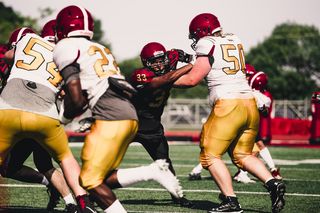Domestic Violence
Football: Does It Encourage Domestic Abuse?
3 ways to limit domestic abuse encouraged by football.
Posted October 16, 2018

America is dominated by the culture of football.
For young boys entering puberty, local and national football heroes provide the ultimate role models for how to be a “real man.”
But what are the values and attitudes that football provides for young males?
Football is a zero-sum-game with a winner-loser paradigm. It is a symbolic universe with two opposing sides, where the mandate is the violent invasion into the opponent’s physical space for the purpose of domination and conquest. The goal of football is to penetrate the opposing side’s defenses and score a goal.
This is a dangerous model of behavior for teenage boys to internalize when they are just beginning to explore the roles they will follow as adults. Guided by the highly idolized model of football players, boys are likely to see interactions with girls as challenges to reach a goal, instead of explorations to build relationships.
The daily news frequently serves up stories about NFL players physically abusing their wives or girlfriends.
In 2014, Baltimore Ravens football player Ray Rice knocked out his fiancée in a hotel elevator. The incident was caught on video, which went viral on TMZ. But It was just one of many such stories.
Jon Shuppe of NBC News has reported that over the last 14 years, there have been 87 arrests for domestic abuse involving 80 NFL players.
It is not surprising that players involved in violence on the field sometimes continue that violence off the field.
Clinical psychologist Dr. Stanley Teitelbaum, author of “Sports Heroes, Fallen Idols and Illusions,” commented, "Elite football players are trained to be very aggressive and violent on the field, that's the nature of the game and that’s how they become important players. And sometimes it's difficult for athletes to turn that off when they go back to their regular lives."
But such violence against women isn’t just confined to the world of professional football. It starts earlier—in college and high school. A recent research study reported in the journal Violence Against Women is titled “Dating Aggression, Sexual Coercion, and Aggression-Supporting Attitudes Among College Men as a Function of Participation in Aggressive High School Sports.” The authors are Gordon B. Forbes, Leah E. Adams-Curtis, Alexis H. Pakalkaand, and Kay B. White.
The authors studied self-reported dating aggression and sexual coercion in 147 college men. They were men who had participated in aggressive high school sports. The study indicated that these men engaged in more psychological aggression, physical aggression, and sexual coercion toward their dating partners. They caused more physical injury, were more accepting of violence, and held more sexist attitudes and hostility toward women than young men not involved in football and violent sports. Results of this study indicate that participation in aggressive high school sports is clearly one of the pathways that can lead to relationship violence.
So, football exists as part of American culture. It’s not going away. And violence and aggression are at the heart of it. In addition to the players themselves, other studies show that the mayhem of football also affects the attitudes and emotions of spectators.
The question is: How can we confine football aggression to the football field, and keep it from invading domestic relations?
Here are three suggestions:
1. In General
It’s important to be aware of the culture of football and its violent nature. And to recognize that those violent attitudes can affect other aspects of our thinking and emotions that aren't directly connected with football.
Train yourself to become adept at emotional intelligence. Emotional intelligence is the ability of people to recognize their own emotions (and those of other people) and to use emotional information to guide your thinking and behavior.
If you get caught up in the violent feelings and attitudes of football in inappropriate situations, emotional intelligence would help you recognize those feelings and put a brake on them.
An excellent book on the subject is “Emotional Intelligence,” by Daniel Goleman.
3. Empathy
Empathy is the ability to relate to other people’s feelings and experience from their point of view. In the case of violent emotions stemming from football, empathy would help you recognize how acting out on your violent emotions would affect the other person.
Mary Gordon has developed an excellent training program to help people of all ages develop empathy. It is part of her organization, Roots of Empathy.
So football is a big part of our American culture. But it is very violent, and sometimes that violence continues off the field, and sometimes it's directed toward women.
Luckily, there are things we can do.
David Evans
© 2019 David Evans




